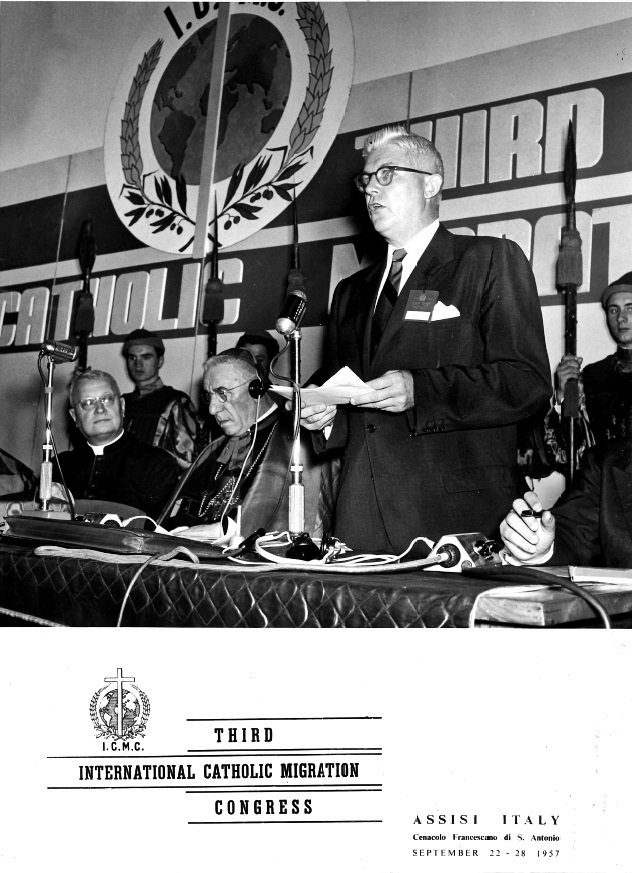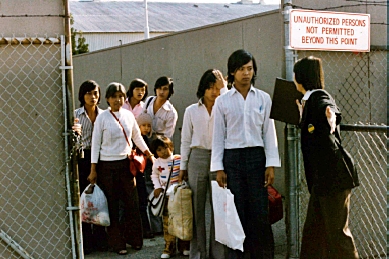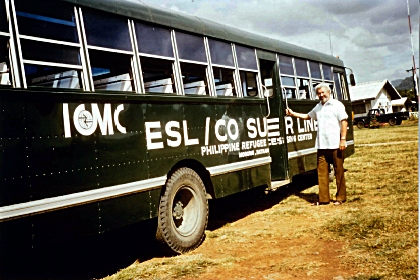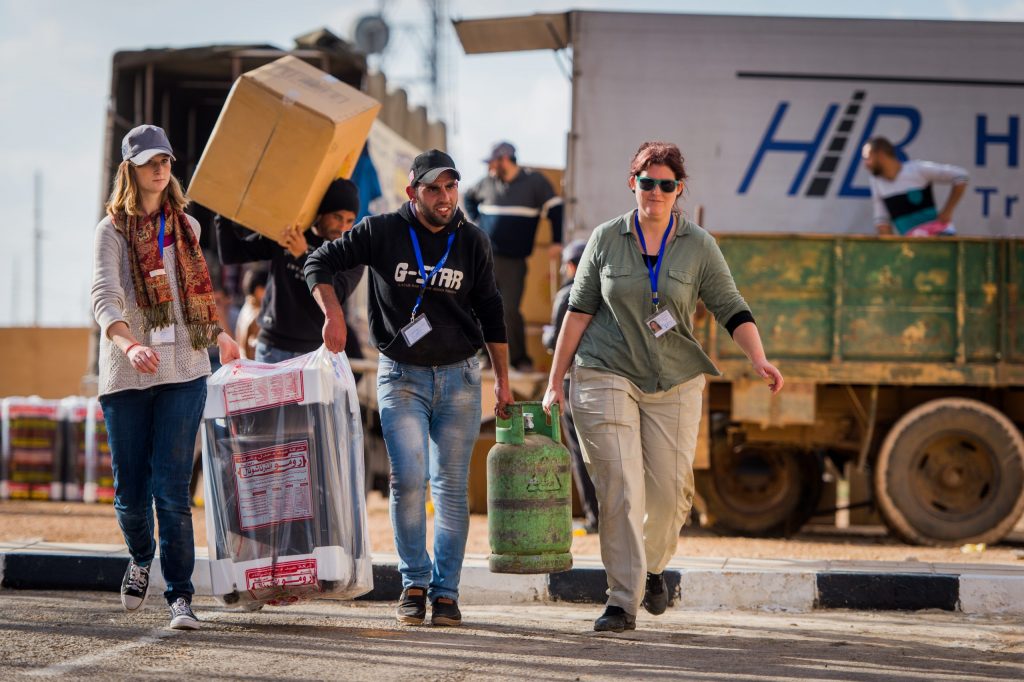The International Catholic Migration Commission (ICMC) is an international non-governmental organization working in the areas of migration and refugee assistance and advocacy. ICMC was founded in 1951, in the wake of the massive human displacement caused by the Second World War. It has consultative status with the United Nations Economic and Social Council (ECOSOC).
Origins
Initiated by the joint efforts of Pope Pius XII, Monsignor Giovanni Battista Montini (Vatican Secretary for Relations with States and future Pope Paul VI) and layman James J. Norris, ICMC was created to support Catholic organizations in responding to the needs of displaced persons and refugees.

Following the Second World War, the efforts of Msgr. Montini and James Norris for the displaced victims of war assumed an even greater urgency with the growing exodus of refugees fleeing to the West from the Soviet bloc countries of Eastern Europe.
Shortly after its creation, the ICMC Secretariat was established in Geneva, Switzerland, with the aim of collaborating closely with the newly created United Nations bodies on migration (IOM) and refugee issues (UNHCR). In 1952, ICMC was granted consultative status with the United Nations Economic and Social Council (ECOSOC). In its early years, the work of ICMC focused on the administration of migrant travel loan funds. ICMC soon gained comprehensive expertise in assisting migrants and increased its network of member organizations and local partners, thus becoming a worldwide movement.
1970s
By the 1970s, the migration phenomenon had become more complex and international.
In 1975, James Norris – who had by then been President of ICMC for over 20 years – won the UNHCR Nansen Refugee Award, the highest UNHCR recognition for “extraordinary service to the forcibly displaced.”

In 1979, after “boat people” fleeing Vietnam perished at sea, ICMC played a major role in providing legal and safe means of emigration, mainly by resettling refugees from Vietnam to the United States through the Orderly Departure Program. ICMC also began resettlement work with new refugee groups from South-East Asia, the Near East, Africa, and Latin America.
During the program’s nearly 20 years of operation, over 500,000 people were resettled, mainly to the United States.
1980s and 1990s
In the early 1980s, ICMC began to work in the resettlement of refugees from Turkey to the United States, in partnership with the United States Department of State’s Bureau of Population, Refugees and Migration (BPRM). The Resettlement Support Center for Turkey and the Middle East based in Istanbul, Turkey, became one of ICMC’s largest operations.

While continuing working in the Soviet Union between the 1980s and the 1990s, ICMC also played a leading role during the war in Yugoslavia: as violence continued to escalate in the Balkans, the ICMC office in Zagreb processed thousands of resettlement applications, mainly by Bosnian Muslims seeking support to emigrate towards the United States. In 1997, ICMC also opened three microcredit institutions (in Serbia-Montenegro and Kosovo) providing business loans, training and counseling to the uprooted people wishing to start a new activity.
In 1998, ICMC initiated a partnership with the UN Refugee Agency (UNHCR) through the ICMC-UNHCR Resettlement Deployment Scheme. The Scheme consists of a pool of experts from diverse backgrounds, who are ready to be deployed on short notice to UNHCR’s field operations in Africa, the Middle East, Asia, and Latin America whenever crucial support is needed.
2000s to nowadays
In 2001, the events of 11 September in the United States caused a major change in world politics. As the United States entered Afghanistan, large numbers of Afghani refugees began returning home after many years in neighboring countries. ICMC took immediate action and started its largest-ever operation assistance in Afghanistan: over 70,000 people returning from Pakistan and Iran were sheltered in camps.
ICMC’s main focus shifted again towards South-East Asia in 2004, as the world rushed to respond to the devastating tsunami which hit the Indonesian coasts. ICMC had been granted access in Aceh in 2001. Thus, it was already present in Indonesia when the tsunami struck and was able to respond immediately to the devastation caused, both at the community and individual levels.

ICMC was granted status as a public juridic person by the Holy See in 2008, which means that it was recognized as a legal entity within the Catholic Church able to act and speak in its name.
In 2011, ICMC was selected as the leading organization in charge of coordinating the civil society network of the Global Forum for Migration and Development, which gathers more than 700 organizations globally; it has maintained this role to date.
Political instability in the Middle East since the beginning of 2011 – notably the Syrian civil war – has caused mass displacements in the region. ICMC, active in the Greater Damascus area since 2006, started a number of projects focusing on Iraqi refugees settled in Syria, displaced people fleeing the conflict into Jordan and vulnerable people within the host Jordanian communities.

In the mid 2010s, ICMC explored the feasibility of establishing a public-private partnership to assist elderly people and protect labor migrants in Eastern Europe.
In addition to its work as part of the US Refugee Admissions Program (USRAP), ICMC’s Resettlement Support Center for Turkey and the Middle East is nowadays assisting governments from other regions, notably the Europe Union.
Today, ICMC continues to respond to the needs of uprooted people and their communities by implementing and advocating for rights-based policies and sustainable solutions through its worldwide membership of Catholic Bishops’ Conferences, and alongside governmental and non-governmental partners.
Headquartered in Geneva, Switzerland, ICMC has affiliated offices in Brussels (ICMC Europe), Washington, D.C. and Boston (ICMC, Inc.), and operational offices in Greece, Lebanon, Jordan, Turkey, Malaysia, and Pakistan.
